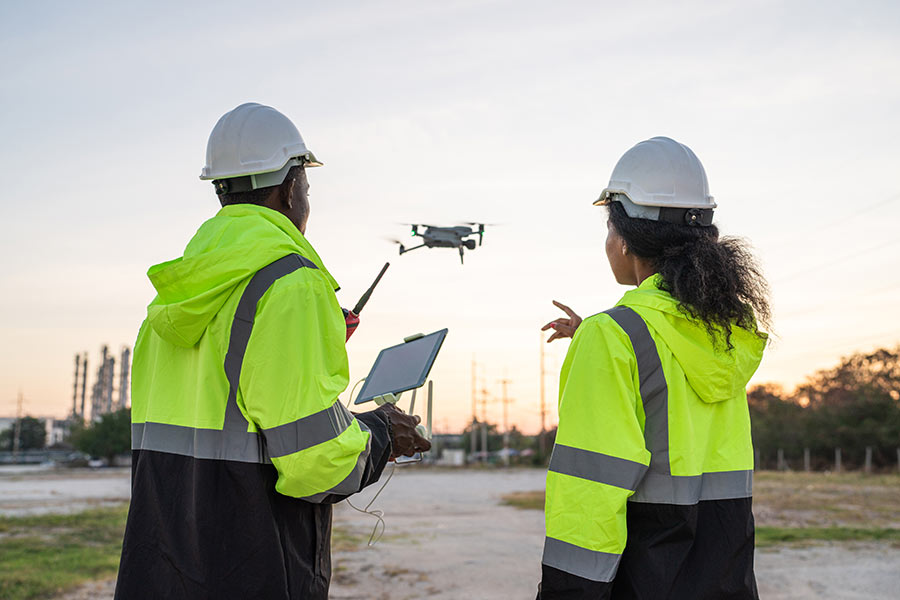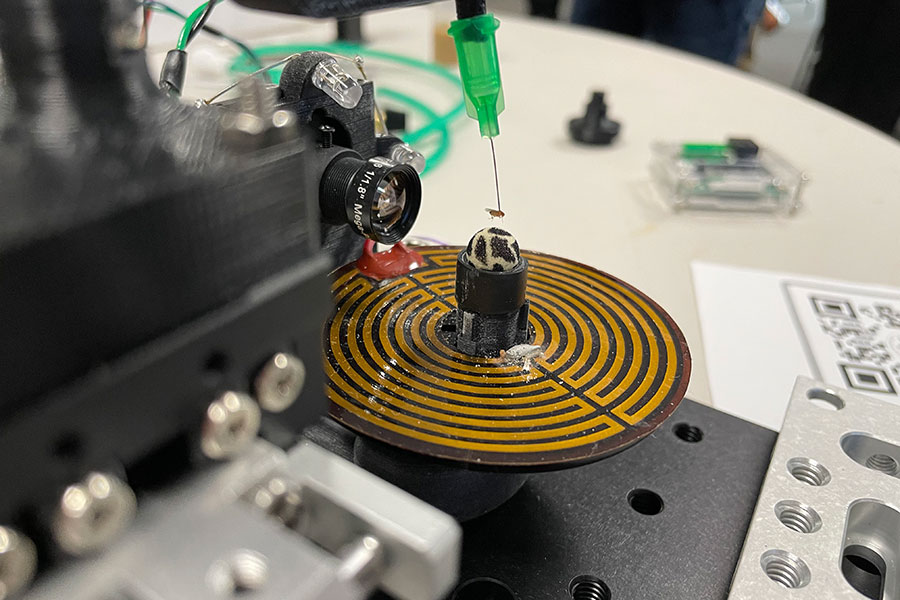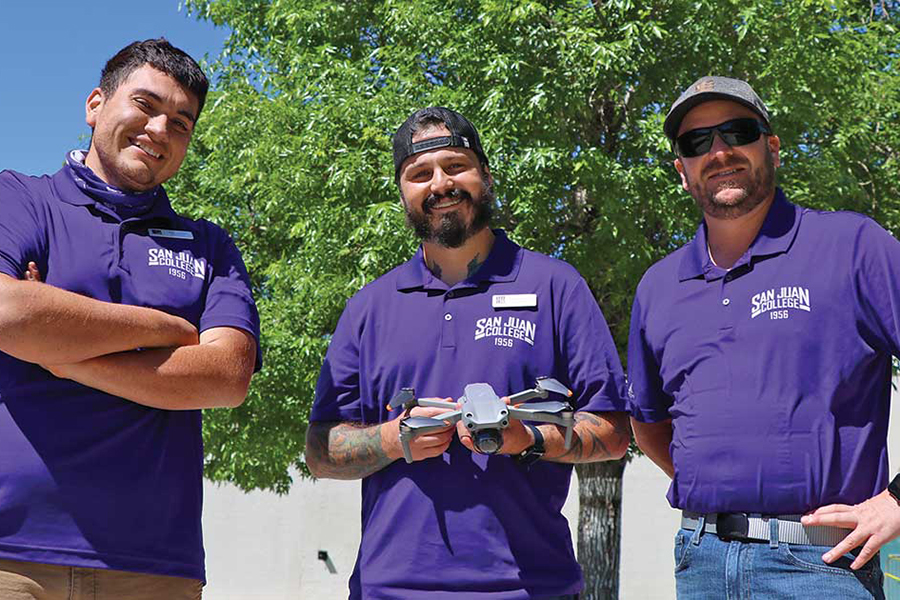Learn how to work with drones, from becoming a drone pilot to engineering customized systems for various industries. Find the drone career path for you.

The job market for roles working with drones is soaring, with drone piloting and drone technology expanding far beyond what most people imagine. From using drones to gather environmental data to engineering custom flight systems, drone job opportunities span multiple industries and skill sets.
Whether you’re interested in hands-on flying or working behind the scenes, drones offer exciting prospects from entry-level positions requiring basic certification to advanced engineering roles demanding specialized degrees. Learn about drone career paths and industry applications that may match your interests and goals.
Core Drone Career Paths
Working with drones can take many forms—you often notice drone-related job opportunities in real estate, construction, advertising, and many other fields. Regardless of the industry, you will frequently find core roles such as:
1. Commercial Drone Pilot
A commercial drone pilot operates an unmanned aircraft for business purposes across numerous industries. They may use drones with attached cameras or sensors to gather information. To work for yourself or in a regular position at a company as a drone pilot, you must obtain Part 107 certification and maintain current knowledge of aviation regulations and safety protocols.
Key responsibilities:
- Plan and execute drone flights for various commercial uses
- Conduct pre-flight inspections and safety checks
- Analyze weather conditions and airspace restrictions
- Capture high-quality aerial data, photos, or video
- Maintain detailed flight logs and comply with regulations
Industries served: Real estate, construction, agriculture, public safety, media production, and infrastructure inspection
2. Drone Hardware Engineer
Hardware engineers design and develop the physical components that allow drones to function or be customized for various uses. These professionals work on flight control systems, sensing equipment, and other parts of these machines.
Key responsibilities:
- Design mechanical systems for drone frames, motors, and propellers
- Integrate sensors, cameras, GPS, and navigation systems
- Test prototypes and troubleshoot technical issues
- Collaborate with software teams on hardware-software integration
Required skills: Mechanical engineering background, electronics knowledge, and CAD software proficiency
3. Drone Software Developer
Drone-related software engineers create the programs that control drone operations, from phone apps with flight controls to complex autonomous navigation systems. This rapidly growing career combines programming with specialized aviation and robotics knowledge.
Key responsibilities:
- Develop flight control software
- Program autonomous navigation and obstacle avoidance systems
- Create mobile applications for drone operation
Required skills: Programming languages (Python, JavaScript), robotics knowledge, AI/machine learning understanding, and problem-solving abilities
4. Drone Data Analyst
In the drone industry, data analysts process and interpret the vast amounts of information commercial drones collect. They transform raw data into actionable insights for businesses and organizations.
Key responsibilities:
- Process aerial imagery and sensor data using specialized software
- Create maps, 3D models, and analytical reports
- Identify patterns and trends in collected data
- Collaborate with clients and team members
Required skills: Data analysis software knowledge, Geographic Information Systems (GIS) knowledge, statistical analysis, and attention to detail
5. Drone Operations Manager
Operations managers oversee organizations' drone programs, ensuring safe, efficient, and compliant work processes. They bridge the gap between technical drone operations and meeting business goals.
Key responsibilities:
- Develop and implement drone operation procedures
- Manage drone pilot teams and flight schedules
- Ensure regulatory compliance and safety standards
- Coordinate with aviation authorities if needed
- Analyze program performance and recommend improvements
Required skills: Project management, aviation knowledge, leadership abilities, regulatory understanding, and business acumen
Apply Drone Skills in These Industries
For all the roles we just outlined and more, dozens of industries keep drone professionals in demand. If any of these appeal to you, you can apply yourself in sectors you are interested in and grow the role of drones and drone education across industries.
- Public Safety and Emergency Response: Drone careers in public safety involve supporting law enforcement, firefighting, search and rescue, and emergency management operations.
- Real Estate and Marketing: The real estate industry extensively uses drones for property marketing, surveying, and development planning.
- Agriculture and Environmental Marketing: Agricultural drone applications include crop monitoring, precision agriculture, and livestock management.
- Infrastructure and Construction: Construction and infrastructure industries use drones for surveying, progress monitoring, and safety inspections.
- Media and Entertainment: Film, television, and advertising industries increasingly rely on drones for aerial cinematography.
Unique Drone Career Opportunities
Creative professionals are carving out even more specialized niches in the drone industry, with jobs such as:
- Drone educator, teaching the community or youth how to fly drones
- Solar panel inspector for an energy utility company
- Wedding and event coordinator with video coverage
- Videographer for a college or professional sports team or network
FAA Part 107 License: Your Gateway to Commercial Drone Careers
To engage in most commercial drone operations, you must earn a Part 107 Remote Pilot Certificate by passing the knowledge test with a 70% or higher score, as required by the Federal Aviation Administration (FAA).
A Part 107 License is required for any operation of a commercial drone in situations including but not limited to:
- Shooting outdoor or indoor footage of real estate listings
- Photography businesses with a drone
- Drone piloting for public safety or construction purposes
This certification ensures your knowledge of aviation regulations, safety procedures, and other key information. To qualify for the Part 107 Knowledge Test, you must be at least 16 years old, have completed a background check by the Transportation Security Administration (TSA), and have passed the knowledge test.
Do You Need a Degree for Drone Careers?
Many entry-level positions or self-employment do not require a complete undergraduate degree, but the answer depends on your chosen career path and advancement goals:
Certificate Programs
Entry-level drone positions, particularly commercial pilot roles, often require only Part 107 certification plus specialized training. Certificate programs provide focused, practical education that demonstrates your education in areas such as:
- Drone operation and safety procedures
- Industry-specific applications
- Basic data analysis and processing
- Regulatory compliance
Certificate programs in fields like Drone Operations and Unmanned Aerial Systems typically take weeks to months to complete and offer quick entry into the workforce.
Associate Degree Benefits
An associate degree, such as an Associate of Science (AS) or Associate of Applied Science (AAS) in drone technology, provides a broader education and significantly better advancement opportunities. Also, a community college or university may have better or more technology to help you practice with professional equipment or connect with local industries.
- Management and supervisor positions often require a degree
- Higher salary potential with formal education
- Broader skill set for diverse industry applications
- Preparation for bachelor’s degree programs, if desired
A two-year degree program like an AAS in Small Unmanned Aerial Systems affords opportunities to gain advanced technical knowledge, such as advanced electronics and engineering principles, to help you take on customization projects. You can also add Geographic Information Systems or general education skill sets as a foundation for continued learning.
Jobs Requiring a Bachelor’s Degree
If you’re interested in the engineering and technical aspects of drone careers, you may need at least a bachelor’s degree to start working in the industry. Many students may start with an associate’s degree, then transfer to a four-year bachelor’s program.
Engineering roles where employers may require or prefer a bachelor’s degree include:
- Drone engineers who design drone systems
- Electrical engineers who create sensors and other internal systems
- Research and development roles in drone technology companies
Even if you enter the field with a certificate or associate degree, finishing a bachelor’s degree can lead to career advancement in senior engineering and technical leadership or give you more experience and connections for starting an entrepreneurial venture.
Start Your Drone Career at San Juan College
At San Juan College (SJC), our certificate and Associate of Applied Science (AAS) programs in Small Unmanned Aerial Systems include thorough Part 107 exam preparation, ensuring you graduate ready for expansive careers in the rapidly growing drone industry or further education.
Whether you’re interested in becoming a commercial pilot, developing drone technology, or managing drone operations, our programs provide the knowledge and experience to launch into this exciting field.



